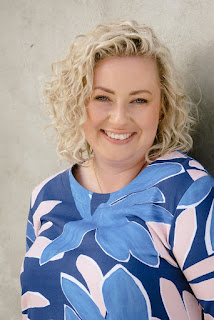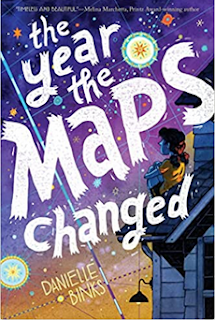
Photo by Janis House Photography
Danielle Binks is the author of the new middle grade novel The Year the Maps Changed. She also has written the young adult novel The Monster of Her Age. Also a literary agent, she is based in Melbourne, Australia.
Q: What inspired you to write The Year the Maps Changed, and how did you create your character Fred?
A: So, the long and short of it is; in 2015 my state (in Victoria, Australia) was holding a general election for state-government representation. And the opposition leader of the time had this idea to reopen the Point Nepean Quarantine Station (est. 1852) and turn it into a modern-day detention centre for refugees.
One of his reasons for this proposal was that the Australian government had done something similar in 1999 during the Kosovo War and something called “Operation Safe Haven” when we bought thousands of Kosovar-Albanian refugees into Australia and housed them at eight different “safe haven” locations around Australia - including Point Nepean.
The modern-day idea in 2015 was resoundly rejected by locals, *because* a modern-day detention centre (inhumane, even going against the UN charter on torture) would be a very different beast from the “safe haven” model of 1999, which they all had really fond memories of.
And seeing all the photos in our local papers, reading these stories, kind of threw me back into that time period because in 1999, I was 11-going-on-12 and I lived on the Mornington Peninsula, and the Point Nepean Quarantine Station.
Suddenly all these memories - hazy, and not deeply understood at the time - came rushing back, and I decided to go digging. The story was equal parts my memories of that time (which is why my character Fred is the same age as I was!) and a deep-dive into the history of the time, while also seeing its connections to a much wider theme and political landscapes in the modern day.
So it's a lot of me and my childhood, and an event I had the fuzziest memories of that I decided to unearth. Write what you kinda-know, right? Fred very much has pieces of me for all those reasons - though she's a much more perceptive kid, and her empathy and understanding grows at a much faster rate than mine did at that age, I feel like.
Q: The author Kate Constable said of the book, “This is a beautiful story about belonging and welcome, about fear and suspicion, and ultimately about the elastic bonds of family and love.” What do you think of that description?
A: Kate Constable is one of my favourite authors (New Guinea Moon and Crow Country are two of my favourites of hers!) so on one level to hear a peer I so admire say that of my own work is a real full-circle, heartwarming gift. And I think she nails the description of the things I am often preoccupied with and keep coming back to in my work ... Yeah. That checks out.
I resisted writing middle grade for a long time. I thought young adult was “my lane.” And then in about 2012 I read Rebecca Stead's When You Reach Me for the first time, and I was stopped in my tracks.
That book deeply affected me, and sent me off on a deep-dive read of all the American MG I could get my hands on (Sharon Creech, Rita Williams-Garcia, Gary D. Schmidt, Cynthia Rylant, and Jacqueline Woodson gave me such an education and opened my writerly heart wide open).
And I realised one of the reasons I so loved it was that time period in my own memory is very close to the surface. I went through my biggest upheavals and changes, internally, at that time, and their books really allowed me to tap back into that and realise these were the stories I wanted to tell, because that time period had actually never really left me. I was still that kid, in many ways, processing that time.
And a lot of that is tied to the bonds I forged with my family then, the fear and self-loathing I felt and had to grapple with - feeling out of place, especially. So of course that's all there in this book of my heart, as Kate so kindly articulates.
I also realised that another reason MG was kind of my storytelling destiny was that I read one of my favourite-ever books and authors when I was about 13 or 14 (I was very bookish and kinda pretentious) and one passage in particular I thought really summarised my feelings of that time perfectly. And I look back at it now and a lot slots into place.
It's from John Steinbeck's East of Eden: “When a child first catches adults out -- when it first walks into his grave little head that adults do not always have divine intelligence, that their judgments are not always wise, their thinking true, their sentences just -- his world falls into panic desolation. The gods are fallen and all safety gone. And there is one sure thing about the fall of gods: they do not fall a little; they crash and shatter or sink deeply into green muck. It is a tedious job to build them up again; they never quite shine. And the child's world is never quite whole again. It is an aching kind of growing.”
I think that's what I'm always going to try and do, in my writing. Capture that “aching kind of growing.”
Q: Did you know how the story would end before you started writing it, or did you make many changes along the way?
A: I am a total “fly by the seat of my pants” pantser. So I had no idea how it would end, and then I did - and I resisted writing it for a long time. Basically, I'd set my book in 1999 and the last time (I think) that my Australian government had done *almost* the right thing by refugees and asylum seekers. Almost.
But after 1999 things really start on the current trajectory that Australia is on, which is an utterly inhumane and disgraceful treatment of refugees. And though I was trying to depict a time period where possibility was still open to us, and we came so close to starting to do the right thing on an international scale, I was writing during a time period when the Australian government was doing particularly egregious things to asylum seekers and refugees. And in my name, as an Australian citizen.
In my best conscience, I couldn't write a 100 percent neatly-tied-bow happy ending for The Year the Maps Changed - because I did have the gift of hindsight, and I needed to acknowledge that the future would be a challenge from here on in. But. I was still writing a book for kids, and I firmly believe that all youth literature cannot end in despair, it needs hope by the end, in deference to our young, impressionable audience.
So I tried my best to match those two pieces up, and it's been really interesting hearing how kids take the ending. Some want really clearly-defined “here's what happened” answers from me, and I just can't give them. But I always like putting it back on the kids and asking them, “Well, what do you think happened?”
Q: How was the book's title chosen, and what does it signify for you?
A: The book's title was chosen because what I originally had, Operation Safe Haven, sounded too much like a mystery-caper, according to my editor! I also floated what the American operations name was for the Kosovo War refugee effort, Operation Provide Refuge - but, same issue.
The theme of maps and geography was always there, so my lovely Australian editor, Kate, pitched a few ideas with the word “maps” and The Year the Maps Changed was one of them. The one that gave us both the good spine-shivers.
To me it signifies that upheaval during the middle-grade years, it's the shifting sands of family for Fred, but in a grander and thematic sense it's also the political landscape currently being restitched. I mean, when I talk to kids about this book, they do find it boggling that I grew up in a world with a country called Yugoslavia, which no longer exists on their maps.
And they can see evidence of a potentially similar situation happening right now, in the world. They connect a few dots with the bigger messages of the novel then, when I point that out.
Q: What are you working on now?
A: I am working on my new MG stand-alone novel, Six Summers of Tash and Leopold. Coming out next year in Australia and New Zealand, it's a middle-grade mystery, set during lockdown in Melbourne (Australia), which was the most locked-down city in the world.
It's about two kids who've always lived on the same street, but when lockdown hits they are thrown together more than ever, especially when one of their neighbours goes missing, and a cold-case disappearance also enters into the equation. So they find themselves having to piece together two mysteries, during the confines of lockdown - and when their neighbourhood suddenly becomes very strange and unfamiliar, the more they dig into it.
Q: Anything else we should know?
A: I do live in Australia, and my novel is out now in America - BUT! - I am more than happy to do online book clubs, classroom chats, workshops - anything! Just reach out; https://daniellebinks.com/ I would love to meet my readers in North America!
--Interview with Deborah Kalb

No comments:
Post a Comment